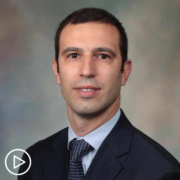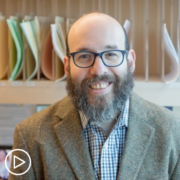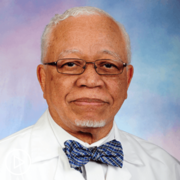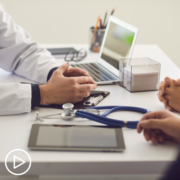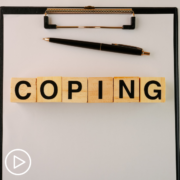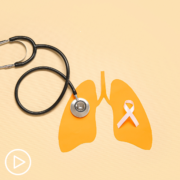Overcoming Small Cell Lung Cancer Care Barriers from Patient Empowerment Network on Vimeo.
How can small cell lung cancer care barriers be overcome? Expert Beth Sandy from Abramson Cancer Center discusses common barriers for patients in remote areas and underrepresented communities, advice for accessing resources and support, and tips to ensure lung cancer stigma doesn’t interfere with care.
[ACT]IVATION TIP
“…work very closely with the social worker in your practice who is very familiar with all of these different resources that are available…I’ll say up front is when providers like doctors or nurses ask you if you’ve ever smoked, that is by no means being something accusatory. It actually helps us understand the trajectory of your disease better… Another thing that we know about both non-small and small cell lung cancer is that patients who have smoked actually often respond better to immunotherapy. So that can help us understand just how your disease may act and what treatments may even work better.”
See More from [ACT]IVATED Small Cell Lung Cancer (SCLC)
Related Resources:
Transcript:
Lisa Hatfield:
So if we can discuss some barriers to getting care for small cell lung cancer. I’ll break it down to three different areas or three different barriers. So if you could discuss or give advice for a person living with small cell lung cancer in a rural area who might not have access to state-of-the-art cancer care. Second area, if you have any advice or specific considerations or recommendations for small cell lung cancer, people dealing with small cell lung cancer from underrepresented communities. And then third, if you need me to remind you of these, I sure will. Third, kind of the elephant in the room, if you can address one of the barriers being the stigma that’s associated with not only small cell lung cancer but with any lung cancer, maybe address that as a barrier and any advice you have for a person dealing with that, we’d appreciate that.
Beth Sandy:
Yeah, so there are a lot of barriers. So let’s talk about the first one. If you’re living in a rural area and having access to state-of-the-art cancer care. I think the one thing that I’ll say here is that small cell lung cancer responds very well and very quickly to frontline treatment, which is chemotherapy and immunotherapy, and these are approved no matter where you live. This is not a clinical trial. You don’t have to go to a fancy hospital to get this.
As a matter of fact, the two chemotherapy drugs we’ve been using for 20 years, so you can get them anywhere. So now the point is about driving. So this is something you have to come back three days in a row for. So is there a place where you can stay close by? So at my institution, we have a charitable organization who turned an old hotel that’s about 30 minutes outside the city into a place for our patients to stay overnight for free. So that is kept up by charitable donations and so if patients live several hours away and they need a three-days-in-a-row treatment, a lot of times they will stay at that location.
So is there something like that that’s available if you’re driving from very far away? But I think the other thing that also concerns me is your blood counts can drop, and you can get sick from this chemotherapy. Most patients do pretty well, but if you’re getting sick, how far are you from the closest hospital? If you have a fever and your white blood cells are probably low, you need to go to the emergency room. So I think those are things to sort of start preparing for ahead of time and thinking, okay, do I maybe need to stay with family members who may be closer to a hospital? Just again, depending on how far away you are.
Where I live, it snows in the winter, so that’s always something that, especially the people in the more mountainous regions are like, what if we get like a foot or two feet of snow overnight and I can’t get out in the morning? How’s that going to affect me? So really thinking about those kinds of things. And are there, again, charitable organizations or money or grant support to help pay for rides or gas money even? Sometimes the American Cancer Society can help with things like that.
Are there specific considerations or recommendations for small cell lung cancer for patients who are in underrepresented communities? So yeah, I think again, talking about getting back and forth to treatment, it can be really difficult, especially with small cell lung cancer. If you’re on radiation, radiation is daily and chemotherapy is three days in a row, like I’ve said. So it’s a lot of back and forth. Do you have to pay for parking? Do you have the rides?
Again, this is where a lot of times we’ll work with our social workers in both radiation oncology or medical oncology to help with transportation. There are transportation options, especially within many insurance plans. So that’s something to look into. The other thing is that at my institution, you have to pay to park, but we offer free parking for patients who are getting chemotherapy and radiation. So that’s not going to be something that you have to pay for on a daily basis, because that would be very expensive.
Other things like meals, so do you probably not feel like going to the store or cooking or aren’t even able to, especially when you’re receiving such intensive therapy. So there are definitely programs that are available to deliver meal services to patients and so that’s something, again, that we work really closely with social work to get these types of things set up. And again, some of this stuff is actually covered through your insurance, visiting nurses, home health aides to help.
The American Cancer Society, I go back to them because they have a lot of resources here. I work in the State of Pennsylvania, and in the State of Pennsylvania, if you are a caregiver to someone, there are actually financial resources that you can be reimbursed just for being their caregiver, especially if that takes you away from your work. So there are a lot of things that working with the social worker who understands the laws and the grants that are in your local communities can be really helpful.
So hopefully, I was going to say my activation tips for this really is to work very closely with the social worker in your practice who is very familiar with all of these different resources that are available. But then I forgot to address the last one, which is the stigma, and I do want to address this. This is something I could talk about for a long time. There is certainly a stigma associated with lung cancer and for patients who have smoked. And one thing I’ll say up front is when providers like doctors or nurses ask you if you’ve ever smoked, that is by no means being something accusatory. It actually helps us understand the trajectory of your disease better.
For example, if you were diagnosed with small cell lung cancer and you said, “Well, I smoked in my 20s and 30s, but now I’m 70,” we might question the diagnosis a little bit. We may do some further testing to make sure this is the right thing. Another thing that we know about both non-small and small cell lung cancer is that patients who have smoked actually often respond better to immunotherapy. So that can help us understand just how your disease may act and what treatments may even work better.
So when we ask you if you smoked, just be honest because that can change the way we think about your disease, but by no means is that something accusatory. The second concern with the stigma is that people are less likely to get screening for lung cancer or to be worked up early because they feel like, “Well, I did this to myself, so maybe it doesn’t matter.” But that’s not true. Obviously, I don’t want people to smoke. It’s bad for you for a million reasons, not just lung cancer, but cardiac disease and other types of cancers. There’s a lot of reasons that smoking is not good for you.
But that being said, lung cancer can still be a curative disease if we catch it early. So even if you’ve smoked or are currently smoking, you can get lung cancer screening and catch things early and get them taken care of. We are there to help you with whatever illness or addiction to cigarettes that you have, and we’re going to help you, number one, treat that, and help you quit smoking, but also treat your disease as we would treat anyone else’s. So getting that screening for lung cancer or that early workup as soon as you develop symptoms is going to be beneficial.
Share Your Feedback:
Create your own user feedback survey
